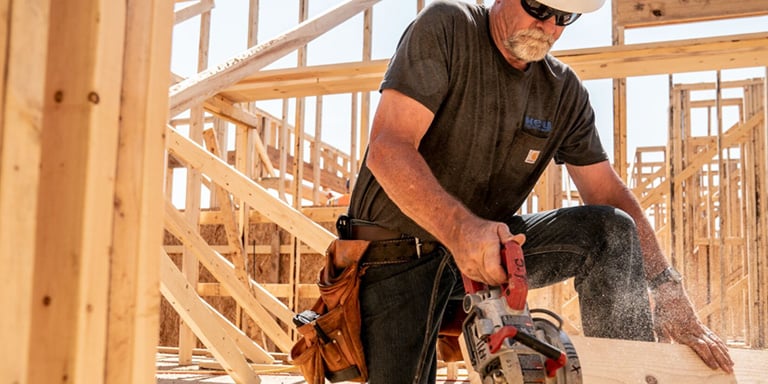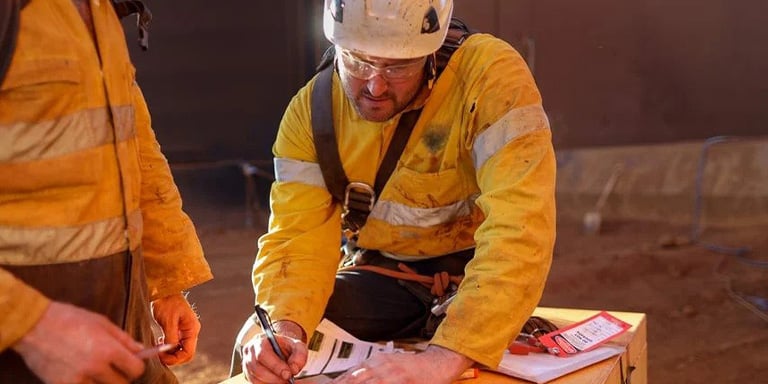
If you're thinking about outsourcing or assigning work, then it's important to reduce your company's liability by selecting the right subcontractor for your project. Subcontractors must be skilled and reliable, but they must also be professional and fiscally responsible. There are many ways that they can either enhance or hurt your company's reputation, so we made sure you have all the information you need to choose the right subcontractor for your project.
Plan The Subcontract

The logistics of any project will determine what makes or breaks it, so proper preparation is the best way to mitigate the inherent risks that come from subcontracting work. It's important to first determine if your business would benefit from the operating leverage of an employee or temp worker over a subcontractor. Subcontractors are highly skilled specialists whose bottom lines match their investments in training, but is this cost worth it for your company?
Bringing skilled tradespeople onto your full-time crew means greater liability, oversight and cost. This cost includes paying them a salary, covering any workman's compensation claims, paying their share of social security/medicare taxes, offering them insurance benefits and perhaps covering vehicle liability insurance. With subcontractors, you don't have to worry about any of these things — but you will take on greater liability if you don't select the right subcontractor for your project.
Scope Of The Project
When you decide to use subcontractors, make sure the scope of the project is clearly defined; The same goes for the scope of work you're subbing out. Estimate the size of the labor force needed by the subcontractor to determine if you'll be hiring a sole-proprietor, limited liability company or several different subcontractors. Also be sure to consider whether or not you'll be okay with your subcontractors subbing out their work once they're awarded the contract.
Make a list of tasks for which the subcontractor will be responsible, and make it as precise and thorough as possible. You'll want to avoid scope creep as your project unfolds, since this can lead to complications and disagreements. In other words, try to plan for unforeseen factors that would gradually increase the subcontractor's duties and responsibilities beyond the scope of the original agreement.
You'll also want to make sure you have a clearly defined timeline for your subcontractor to refer to and follow. This framework may mean designing a schedule for them or outlining when they can and cannot be on the job site. Think carefully about any deadlines and milestones subcontractors will have to follow and be aware of.
Many of the details and duties of the contract will become the responsibility of subcontractors, so make sure you're aware of their rights and obligations to avoid disagreements. Think about any technical details the subcontractor will be responsible for, and plan for any equipment that they might need. Will their equipment need fuel, power or any special accommodations?
Payment is another important consideration when defining the scope of a project. Be sure to consult the project's schedule of values to make sure the expenses from subcontracting are thoroughly budgeted and reasonable. If you're in doubt about what the average price for a job is, let the bidding process show you what the current market rate is.
Contact Potential Subcontractors

Once the logistics and scope of your project are clearly defined, it's time to reach out and generate leads. It may be important to know how much input your client will want in your subcontractor selection, so make sure your decision making capacities are clearly defined and contractual, if necessary. Some architects, engineers and investors may want you to use certain subs (or certain types of subs) for a project, so always be flexible but ready to negotiate for what you think is best.
The Request For Proposal
When publicly announcing your project for subcontractors to bid on, it's important that you define your needs and expectations. If you know exactly what service you need and know exactly how much you're willing to spend, submit a request for quote (RFQ). RFQs are fine for common jobs, but the many unique variables of construction and civil engineering projects make it best to submit a more comprehensive request for proposal (RFP) to gather quotes from different subcontractors
For more resources on making an outstanding RFP, visit the Associated General Contractors' (AGC) website, and remember these steps:
- Introduction: Briefly describe what your project is, where it is and its start and end dates.
- Company and history: Introduce your company by describing what you do and some of the projects you've completed. Also describe the stakeholders and other clients involved.
- Outline the project's scope: Describe what your company will be doing and why a subcontractor is needed.
- Outline the subcontractor requirements: Describe any skills, experience or other expectations for this project.
- Define the timeline and schedule: Include all dates and times that subcontractors are expected to work, and list expected deadlines and milestones.
- Describe the pre-qualification process: State what your selection criteria will look like and clearly define what your expectations are.
- Describe how candidates should respond: Include a phone number and email address with a contact and/or department name.
Post Your RFP Online
You must decide if your request for proposal will be available to the public, if you'll be submitting it to a select group of subcontractors, or both. It's best to post the RFP where it will be seen by as many qualified candidates as possible. Beside posting it on your company's website, you might also consider posting it on these websites:
The amount of time it will take bidders to respond to your RFP depends on the scope and complexity of your project; it could take anywhere from a few weeks to a few years. Make sure your expectations regarding response times are reasonable, and make sure you submit your RFP sooner rather than later.
Research Selected Subcontractors

Once you have some responses to your RFP, gather at least 3 of them to research and compare in order to find the best partnership for your project. Make these decisions by looking for bidders that seem most capable of doing a high-quality job given the parameters. It's best not to consider price since hiring the right subcontractor for your project may mean a substantial financial investment. Focus on bidders who seem well-established, skilled and experienced over ones who are cheap.
When selecting candidates, it's important that you follow external regulations and internal controls to avoid problems down the line. If your company has a compliance department, be in regular contact with them during this phase of subcontractor selection. Look for any obvious signs that the subcontractor may not fit with your company's safety culture or state regulations.
Scour the internet for information about the companies you've selected. Check out their websites, and be sure to look up their Better Business Profiles and Yelp reviews. Look for reviews on third-party websites, and look up clients they've worked for in the past. You want to make sure your selections are not only specialized for your project's niche, but also that they're a legitimate business.
When researching candidates' reputations, ask yourself:
- Are they experienced?
- Are they reliable?
- Have they abandoned any jobs?
- Do they do quality work?
- Do they maintain professional communication and appearance?
- Are they efficient?
Because of the unique nature of many projects, make sure your contacts are bidding on the same thing since it's likely that different companies will take different approaches or have divergent considerations. Try to distinguish between what's included and what's not included in each response to narrow down the details to find consistencies and the best value for the best price. It's important to not rush the bidding process since the most qualified subcontractors may take longer to respond.
Complete The Pre-Qualification Process

Once you've completed the process of comparing and contrasting proposals to narrow down your search to the best subcontractor, it's important to conduct a pre-qualification screening. Hiring a subcontractor significantly increases your company's liability, so it's important to make sure they're worth the risk. Find out more about their background by examining a portfolio of their work and ask them to disclose which general contractors they've worked for in the past.
Certification and Licensing
Be sure to get copies of all appropriate documents and cross-check them with the subcontractor's home state to ensure their validity. There are online tools to make sure subcontractors are in compliance with all state licensing and certification regulations. Make sure they have a valid driver's license as well.
Financial Background
Ask your chosen subcontractor to submit financial statements that show how they manage their funds and project expenses. Have they declared bankruptcy? Has a company they've worked for declared bankruptcy? Be sure to research county court records to find out if they've been sued.
Safety Culture
Find out about their Safety Culture by asking about their compliance standards, and speak to the chief safety officer (CSO) if the company has one. Does the CSO have a 30-hour OSHA certification (or does anyone in the company)? What about medical or public safety education? How much time has the company lost to accidents? Request other safety records, including OSHA forms 300 and 300A, as well as the company's EMR verification. It's important to be mindful of the company's safety culture, so regularly ask yourself, “what does their general mindset regarding safety seem to be?”
Logistical Capabilities
Make sure you clearly define your expectations regarding scheduling and timeframes. Will the subcontractor be available for the entirety of the project? Do they have any other jobs that may interfere, or do they plan on taking on more work while subcontracting for you?
It's a good idea to have them disclose the full size of their organization to ensure they have the labor force to complete the project in the timeframe given. But beyond just getting the numbers, be sure to meet their team and keep these questions in mind:
- Do they have a professional demeanor?
- Do they seem safety conscious?
- How long have they worked together?
- What projects have they completed together?
Make sure they have the documents to prove legal possession of any equipment, as well as the licensing necessary to use it. If they need to rent or acquire equipment after being awarded the contract, make sure that they already have a plan to do so (you can ask for a written outline to ensure they do actually have an appropriate plan in place).
Complete Insurance Checks
One of the most important things you must do is complete insurance checks, and make sure you're not increasing your company's liability with the wrong subcontractor. Larger projects may require professional liability (also called an error and omissions policy) to protect you, the client, and the subcontractor if anyone's expectations aren't met. Be sure to ask the subcontractor if they have their own professional liability or E&O policy. If you frequently hire subcontractors, this policy may protect you no matter how big the projects are.
Make sure the subcontractor's business insurance coverage matches the scope of your project. If they have their own crew, it's important to make sure they have workman's compensation coverage. Be sure to understand how much their general liability covers, too. Even if they are operating their own company vehicles, it's a good idea to make sure they have a valid driver's license and insurance, since not having them may complicate their ability to show up to the job.
Cover All Your Bases
Many unexpected events can be expected as a big project unfolds. Therefore, it's important to prepare for any unforeseen circumstances and expenses before awarding a subcontract. Look for all places where project costs might increase, and make sure you can control the cost of extras. Being proactive about problems before they happen will decrease the risks of hiring a subcontractor.
Award the Contract

Once your company has completed the selection process, you must finalize any administrative considerations before signing a work agreement. Agree on price and pay structure, and make sure both parties have access to a completed bill of quantities. When finalizing the contract, retain the power to negotiate and include clauses for:
- Fee structures
- Payment terms
- Cancellations
- Deadlines and milestones
You'll also want to establish the communication parameters that are best for both companies. Decide if the subcontractor must submit daily accountability reports, receipts or any other documents on a frequent basis. Establish clear communication standards by telling the subcontractor the best times to contact you or others at your company.
Even though subcontractors are not your employees, there are still tax forms that you'll need to deal with when hiring them. You must file a W-9 to request their Taxpayer Identification Number (TIN) which will either be a social security number or Employee Identification Number (EIN). Make sure you check the box that exempts you, the general contracting company, from tax withholdings. If you pay a subcontractor $600 or more, you must also send them the IRS form 1099-MISC by January 31st.
Prepare and Sign Contracts
Make sure that you consult an attorney who specialises in your industry while preparing any contracts regarding project scope, expectations and tax considerations. Firing a subcontractor may constitute a breach of contract, so make sure you clearly define the parameters of your expectations. Be sure to visit the websites of trade organizations like the AGC to find out more about contract laws and download agreement forms that you can use.
It's important to remember that finding the right subcontractor takes dedicated time and research, as well as an investment of money and risk. These business partnerships may last for years or decades, and the way that you interact with subcontractors may determine whether or not they will want to help your company or recommend you to others. Before you move forward with any major contracts (or if you're a new general contractor), be sure to contact an attorney and look into programs offered by contacting organizations and their local chapters.
Did you find this article helpful?



